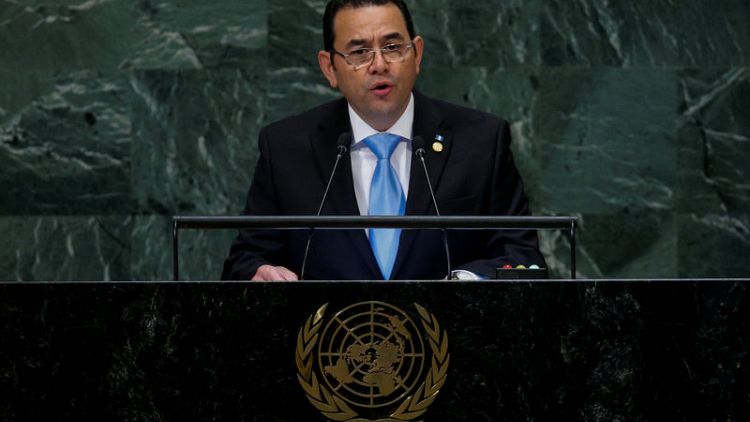By Dave Graham
UNITED NATIONS (Reuters) - Guatemalan President Jimmy Morales slammed a U.N. anti-corruption body on Tuesday, telling the United Nations General Assembly that the agency that has attempted to prosecute him was a "threat to peace" in the Central American nation.
Morales decided last month to not renew the mandate of the U.N.-backed International Commission Against Impunity in Guatemala (CICIG) and banned the body's head from setting foot in the country, on the grounds they violated laws and sowed "judicial terror" with "selective justice."
Morales was scheduled to meet with U.N. Secretary-General Antonio Guterres on Tuesday night, Guatemala's government said in a brief statement without providing further details.
The comedian turned politician dedicated more than half his speech at the United Nations to condemning the CICIG, accusing it of abuses of power, violations of human rights and politicizing justice in Guatemala.
He also attempted to blame deaths on the CICIG, saying that it had caused fatalities by pressuring judges to deny five unidentified suspects in custody proper medical treatment.
"In essence, the CICIG has become a threat to peace in Guatemala. The CICIG has created a system of terror, a system wherein those who think differently are persecuted," he said.
The ideals of the CICIG had been lost in U.N. bureaucracy and the "cult of personality, which should never be greater than the institution it represents," Morales said.
CICIG head Ivan Velasquez, a hard-charging Colombian prosecutor, helped bring down and imprison Morales' predecessor as president. Working with Guatemala's attorney general, CICIG in 2017 also sought to prosecute Morales over illegal campaign financing allegations.
Morales' moves to dismantle CICIG have prompted what critics have labelled a "constitutional crisis" in Guatemala.
The nation's constitutional court issued a provisional ruling on Sept. 16 allowing Velasquez to return. But the government has nonetheless refused to let him return to Guatemala, asking the United Nations instead to name a new leader for the mission.
Morales repeated that request in New York in his speech.
The United Nations said on Sept. 19 that it would send an assistant director to lead CICIG as Velasquez remains banned.
(Reporting by Dave Graham in New York; Additional reporting by Sofia Menchu in Guatemala City; Writing by Anthony Esposito; Editing by Jonathan Oatis)
